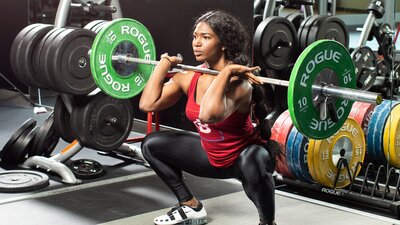
Olympic Lifts for Bodybuilders (And the Rest of Us)
Why let CrossFitters have all the fun? Variations of the Olympic lifts can have incredible benefits for every lifter if you pick the best version for you. These are the best choices for those of us not headed for the Olympics.
What is Olympic Lifting | Learn the Olympic Lifts | Olympic Lift Variations | Olympic Lifting and Bodybuilding | How to Master the Olympic Lifts | How to Prep for a Weightlifting Meet
Learning the Olympic lifts is a game-changer for a lot of lifters. Yes, the clean and jerk and the snatch require coordination, timing, mobility, and explosiveness. But here's the thing: the full Olympic-grade snatch and clean and jerk don't have a monopoly on those benefits!
As I explained in "3 Explosive Moves for Muscle Growth," explosive lifting can be every lifter's secret weapon for gains. But there's a catch: Not every movement you do in the gym is worth doing explosively. Variations and regressions of the Olympic lifts, like hang cleans and dumbbell snatches, can offer all of the upside and none of the downside, provided you approach them with patience, focus, and purpose.
If you're looking for knockoffs of the lifts where you can cheat big weights up for reps, go somewhere else. But if you're ready to learn, let's start.
Are Olympic Lifts for Beginners?
Not true beginners—not a chance. If you can't perform solid ass-to-grass front squats, or full and technically sound overhead presses, you need to spend more time working on your foundation before incorporating any version of the Olympic lifts into your training. That, for me, is the line. But if you're an intermediate lifter who's above that line, you're ready to add some explosiveness.
Here's where it all starts: Clean variations require what is known as "triple extension." That means all three of these joints are extending at the same time:
- Ankle
- Hip
- Knee
Then, there's a high pull with the shoulder and elbow. If one of these isn't there or is done poorly, the entire strength of the lift suffers.
Before you go any further, spend some quality time with these two drills to understand the extension phases and the catch phases. You can do both with an empty bar—it also happens to be a great warm-up. Then, once catching the empty bar becomes second nature, you're ready add some weight.
Option 1: The Hang Power Clean
Thanks to a few kinda sketchy CrossFit WODs, many coaches these days shame the idea of multi-rep Olympic lifts. But if you ask me, there's nothing wrong with doing sets of 3-5 hang cleans with good form.
That's right: I wasn't on a platform, and I wasn't using bumper plates. The weights were rattling like an old pickup—and that's kind of the point. If you've got a barbell, plates, and the basic form down, you can go train like this today in any gym.
Do it first in your workout when your tank is full, and focus on exploding up out of the bottom position.
Moving a heavy bar? Don't let your grip hold you back. Strap up and pull strong!
Option 2: The Dumbbell Snatch
For the life of me, I don't know why more people don't do these. You'll find them front and center on shoulder day in my BodyFit plan Garage Gains: Dynamite Dumbbell Workouts for Size. They're perhaps the greatest unilateral total-body movements to build speed, strength, and coordination. Plus, the conditioning they demand is sneaky. Do a few reps, and you might wonder who pumped all the oxygen out of the room.
Start your reps from a hang position rather than the floor and add a solid hip drive to generate momentum for the weight to travel upward. This is especially important once you progress to using heavy loads.

Option 3: The Power Clean and Jerk
If cleans are no problem technically, the next step is to get your whole body into them by learning the full clean and jerk.
Pulling from the ground is a great goal, but start out pulling from the hang. This can be a lower back saver, but it also forces you to be more explosive. That can lead to some surprising gains in trap and delt development. Alternately, you could perform the pull from blocks.
If you don't have access to bumper plates or can't drop weights in your gym, this is where your Olympic journey ends. Stick with accelerating lighter loads, so you can lower them safely.
Getting serious about Olympic lifting? A nylon lifting belt can give you extra support while remaining flexible and comfortable.
If you've got the gear, though, it's time to start moving toward the big lift. Start by doing a version where you perform a power clean, pause in the rack position, and ride it down into a full front squat. Then set your feet and drive through your legs for a full push-press or split jerk.
Once you're confident there, you've earned the right to aim for the finished product.
Option 4: The Power Snatch to Overhead Squat
This is where things get serious. As I've written before, the overhead squat is a different animal than a front or back squat, and it comes with its own cues and difficulties. But make no mistake: If you want to snatch, you need to be able to overhead squat first.
Once your overhead squat is up to snuff, use the same drill I recommended for the clean and jerk. Perform a full power snatch, then ride it down into an overhead squat with weight that safely works for your abilities. This will help build the confidence and balance you'll need to perform the full snatch.
Approach this very seriously in order to be safe and technically sound. Approach your time with the bar as practicing the skill of strength—don't just run to the nearest platform and load up. News flash: You're not going to the Olympics. So if you're humble enough to do what it takes, start where you're at and start getting better.
Creatine and explosive lifts are a match made in gains heaven. Keep it simple: Take 5 grams a day, every single day.
